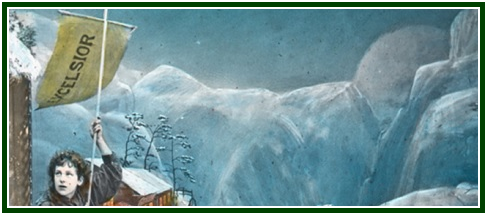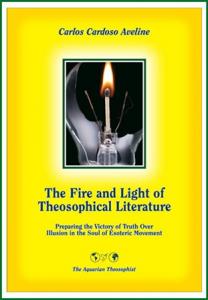
The Poem That Inspired the Motto
of Helena Blavatsky’s Inner School
Carlos Cardoso Aveline

In 1890, while closing the preliminary explanations to Instruction III of her Esoteric School, Helena P. Blavatsky mentioned a “great American Poet”, whose name an easy research safely shows to be Henry W. Longfellow.
Addressing those among her students “whom no hardships, providing they lead them to the eternal TRUTH, can ever discourage”, H.P.B. adopted an idea from the poet as the motto of her inner School:
“Up and onward for evermore!”
And she added:
“Let this be the motto of the E.S., applied to Death of Selfishness and Sin through the bright dawn of the resurrection of the Divine Science now known as THEOSOPHY.”[1]
Indeed, every true learning contains a probationary effect.
A short time after HPB’s death, the School founded by her was distorted by Annie Besant and others, and became a tool in the search for political power within the theosophical movement. However, the problem thus created belongs mainly to the outward world. The true esoteric school is not on the material plane of life. Esoteric teachings transcend bureaucracy. They are as alive as ever in the 21st century. The poem by Longfellow – indirectly quoted by HPB -, exemplifies the universal and unlimited language of immortal wisdom. [2]
The phrase “Up and onward for evermore!” is a translation of the Latin word “Excelsior”. And this is the title of the poem which HPB mentions without naming Longfellow by name.
We will reproduce it now.
Its verses describe the individual search for That which is eternal and divine. Once the decision is made, the pilgrim must look for constantly wider and self-renewing horizons, until he leaves ignorance behind altogether. Longfellow wrote these symbolical lines:
Excelsior
The shades of night were falling fast,
As through an Alpine village passed
A youth, who bore, ‘mid snow and ice,
A banner with the strange device,
Excelsior!
His brow was sad; his eye beneath
Flashed like a falchion from its sheath,
And like a silver clarion rung
The accents of that unknown tongue,
Excelsior!
In happy homes he saw the light
Of household fires gleam warm and bright;
Above, the spectral glaciers shone,
And from his lips escaped a groan,
Excelsior!
“Try not the Pass!” the old man said;
“Dark lowers the tempest overhead,
The roaring torrent is deep and wide!”
And loud that clarion voice replied,
Excelsior!
“Oh stay”, the maiden said, “and rest
Thy weary head upon this breast!”
A tear stood in his bright blue eye,
But still he answered, with a sigh,
Excelsior!
“Beware the pine-tree’s withered branch!
Beware the awful avalanche!”
This was the peasant’s last Good-night.
A voice replied, far up the height,
Excelsior!
At break of day, as heavenward
The pious monks of Saint Bernard
Uttered the oft-repeated prayer,
A voice cried through the startled air,
Excelsior!
A traveller, by the faithful hound,
Half-buried in the snow was found,
Still grasping in his hand of ice
That banner with the strange device,
Excelsior!
There in the twilight cold and gray,
Lifeless, but beautiful, he lay,
And from the sky, serene and far,
A voice fell like a falling star,
Excelsior! [3]
The idea of going “Up and onward for evermore!” transmits the same message present in another poem admired by HPB and which she quoted in various occasions: “Up-Hill”, by Christina Rossetti.[4]
The search for wisdom is an individual pilgrimage which cannot be transferred to any earthly organization, whether it is called “esoteric school” or not. There is no conventional book of recipes for those who want to attain to wisdom, and a Mahatma wrote:
“The Occult Science is not one, in which secrets can be communicated of a sudden, by a written or even verbal communication. If so, all the ‘Brothers’ should have to do, would be to publish a Hand-book of the art which might be taught in schools as grammar is. (….) The truth is that till the neophyte attains to the condition necessary for that degree of Illumination to which, and for which, he is entitled and fitted, most if not all of the Secrets are incommunicable. The receptivity must be equal to the desire to instruct. The illumination must come from within.” [5]
As to the unavoidable struggle between sincere pilgrims and conscious error, Longfellow translated these lines from Friedrich von Logau:
Truth
When by night the frogs are croaking,
kindle but a torch’s fire,
Ha! how soon they all are silent!
Thus Truth silences the liar. [6]
Sincerity is an effective talisman and a source of light for all. As long as the pilgrim tries his best and learns from mistakes, he is a winner and there is no death for him. Outer forms are left aside from time to time while the real life continues to flow, up and onward.
NOTES:
[1] “Collected Writings of H. P. Blavatsky”, TPH, USA, Volume XII, p. 599.
[2] See in our associated websites the article “A 3,000 Years Esoteric School”.
[3] “The Works of Henry Wadsworth Longfellow”, The Wordsworth Poetry Library, UK, 1994, 886 pp., see pp. 66-67.
[4] On the theosophy of the poem “Up-Hill”, see the article “The Up-Hill Road” in our associated websites.
[5] “The Mahatma Letters”, TUP, Pasadena, Letter XLIX, pp. 282-283.
[6] “The Works of Henry Wadsworth Longfellow”, The Wordsworth Poetry Library, p. 141.
000
On the role of the esoteric movement in the ethical awakening of mankind during the 21st century, see the book “The Fire and Light of Theosophical Literature”, by Carlos Cardoso Aveline.


Published in 2013 by The Aquarian Theosophist, the volume has 255 pages and can be obtained through Amazon Books.
000